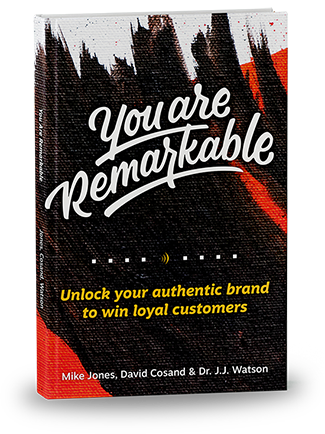Podcast: Play in new window | Download
Subscribe: RSS
How often have you done something because everyone expects you to?
Probably once a day—if not more. While doing what’s expected is part of life, it’s another trap for B2B companies when it comes to solid, authentic brand development.
In our last article, we wrapped up the mistake of ‘accidental branding’ based on temporary aspects of a company. We also discussed how false beliefs lead to non-branding. A third approach we often see is “arbitrary branding,” which is motivated by the same doubts and skepticism as non-branding.
Situations come up that force companies to paste together a brand strategy of some kind—perhaps your marketing team insists on it. They recognize that “having a brand” and “brand consistency” are important, but they don’t want to invest any thought, time, or money into figuring out what the brand actually is. Arbitrary Branding is when a brand defines itself because of expectation, making a random decision, and then sticking with it.
The Problem of Arbitrary Branding
What makes a decision “random” is that there is no ultimate explanation or story behind it, it simply reflects a pure act of will by the leadership, the marketing team, or the intern tasked with designing a logo. If you ask, “why?” there is no real answer. Core elements that compose a brand can’t be “invented”, “made up”, or “improvised” on the spot.
They are discovered, not invented. Companies are mistaken when they think that:
- The purpose of an organization can be invented arbitrarily.
- The brand expression of an organization can be invented arbitrarily.
- The relationships with an organization can be invented arbitrarily.
- The story of an organization can be invented arbitrarily.
These four building blocks of a brand aren’t arbitrary. While the decisions of leaders and others are all part of a brand’s story, they do not “make up” a story or narrative. A brand’s story is non-fiction.
In this article, we’re going to tackle the first two pitfalls of Arbitrary Branding—pretentiousness and randomness.
You Can’t Invent a Purpose (and It’s Pretentious to Try…)
Your purpose is something objective and enduring, a real part of what makes your company continue to exist. Your company’s underlying, unifying purpose has real weight and substance. It explains how you choose to operate in the present and where you want to head in the future.
Yet we’ve seen so many companies who try to make up their purpose out of thin air. They don’t have a lot of time to put thought into it—they’re too busy selling. Inventing a “purpose” is just a step to giving a pitch or getting some investment. A lot of startups do this: they think they understand branding. They’ve read some branding books, made something up in an afternoon, and it sounded clever. They checked the “mission and vision” box. Maybe it got them to a name and a logo, and that’s good enough. “Whew! Glad we got that out of the way. Time to move on to something that actually matters.”
Brands with arbitrary purposes are everywhere. It’s the vague statement that doesn’t quite mean anything or the repetition of trendy buzzwords. The noble idea that nobody follows through on, the lofty vision irrelevant to the everyday. The company which says it exists to “Be the greatest at what we do.” There are “mission statement” generators online that sound about as authentic. An arbitrary purpose is a “pretend” purpose. No one believes in it, and no one follows it, because no one really cares.
Your Brand’s Purpose Isn’t Invented
It has to be discovered. You have to search the world around you and figure out why it needs you, distinctly. Why does responding to your customers’ needs motivate you? Why does it motivate your team? Your leadership? You have to observe not only your current passions but also your enduring cares throughout your history.
Coming to a shared understanding of your organization’s purpose takes time. It takes reflection and introspection, and even some awkward and uncomfortable conversations. It might even cause “drama” or a few fights. That might sound intimidating, but it’s healthy and important. Until you define your aims, you are going to be aimless. This isn’t something you can carelessly delegate.
All of us as individuals have things we’re capable of doing. We’re good at them, but they don’t excite us. We don’t get any satisfaction out of doing them. Then, there are other activities which we’re not only good at, but which we find immensely gratifying and fulfilling, that seem to just naturally “fit” us. Other people may not understand why we like it, and might even think it’s kind of boring or uninspiring, but we love it. They’re gifts. While life inevitably requires us to do a bit of both of those things, we’re happiest when our work is aligned with our gifts.
The same is no less true of groups. Your company can do some things well, and some things not so well. Of those it does well, there are some things it just has to do as part of operating, and some things it exists to do.
Why is your team driven to serve your customers? Why do your customers need you? Looking for your purpose in your gifts is the place to discover it.
Brand Expression Isn’t Random
Just like you can’t invent your purpose, you can’t randomly make up the way your brand expresses itself.
Or rather, you can, but it’s going to impact your business in ways you never imagined.
Imagine that you arbitrarily choose that your colors are red, or blue, or yellow-green, or whatever, because that’s a color you like, or your mom likes, or it’s a color that looks “different” from the competition. No one will stop you from picking a color that way.
Colors are extremely memorable though, and every culture has long-standing associations with each color. The associations are at least partly cultural: “red” and “blue” in American political culture are reversed in the U. K., and the white of an English wedding is the color for mourning in a Chinese funeral. The associations may also be partly biological, like the calming effect of a light blue sky and green grass, or all the associations we have with the darkness of the night sky.
So, when you spin the color wheel and land on orange as your company color, you’ve determined a large part of how people are going to remember and think about you, for the remainder of your company’s lifespan. And once you’ve set your color scheme, changing it isn’t easy (imagine if Coca- Cola tried to pivot to purple).
And that’s just a color!
Every Aspect of Your Brand’s Expression Matters
All of the other aspects of your brand’s expression are going to impact how people inside and outside your company think of its identity. What is your name and what typeface is it in? What is your logo? Which style do you write in, and when? Which images do you use, and when? Who is the voice of your company in videos and advertisements?
If it doesn’t match your core identity, it will either produce a kind of dissonance that is a constant drain and drag on your company, or it will slowly shift the culture and values of your company to match those arbitrary choices you made. Rolling the dice now, or picking something your sister’s boyfriend suggested has a definite thrill to it, but if your identity doesn’t guide your choices, these choices will guide your identity.
Brand Identity Versus Brand Expression
Many people misidentify their brand identity with their brand expression. They think that their brand is just their brand expression—and since they can make an arbitrary choice to settle their brand expression, they can make an arbitrary choice that defines their brand.
That’s a mistake. Your brand isn’t invented, it is born.
People don’t invent themselves, and brands are born out of relationships between people and the purpose which organizes them together. Your brand already exists before you start to choose how you want to represent it. Your brand expression is an attempt to communicate that brand identity outwardly, and it is how other people learn to recognize your brand identity. It should be carefully and creatively crafted to fit the reality of who you are.
Back when companies were listed alphabetically in the phone book, one tactic some companies used was naming themselves “AAA”, like “AAA Painting” or “AAA Plumbing”. That tactic, of course, died off with the internet, because the “AAA” was an arbitrary and meaningless choice.
Arbitrary choices can be arbitrarily changed just as easily as they were first established. Meaningful choices endure. You can’t build an enduring, remarkable brand arbitrarily. It takes intentionality.
——
If you’re part of a company, businesses, or team that could use guidance toward a more intentional, thorough brand strategy, give us a shout! If you’d like to know if your company subconsciously uses arbitrary branding (or just want to know more about arbitrary branding), we’d love to chat. With videos, free tools, and our brand maturity assessment, we’ve got tons of resources for those working already in the thick of the branding process. And if you’re looking for one-on-one help, ask us about our professional branding services to help B2B companies move past arbitrary branding into a coherent, meaningful brand identity.



